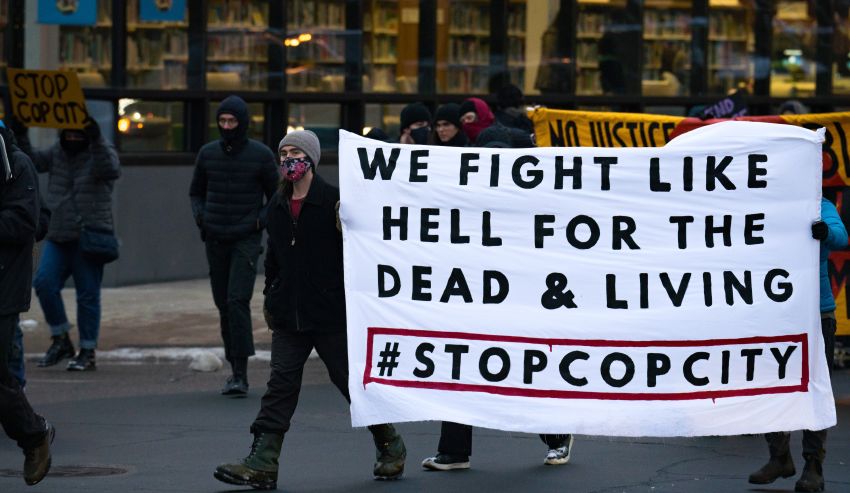
Protests are continuing against the construction of a police training centre in Atlanta, Georgia, despite police violence. Activists are opposing the further militarisation of police that the centre will contribute to and the clearing of forest on unceded Muscogee land.
Protests began when the city announced plans to open the US$90 million Atlanta Public Safety Training Center (PSTC) in 2021 — dubbed “Cop City” — and grew in size as activists from other parts of the country came to Atlanta.
The centre has garnered national attention from Democratic and Republican supporters of fighting “crime” by giving police more weapons and powers.
Police reform and environmental activists have joined together in protesting the centre, including setting up a camp in Atlanta’s South River Forest (called Weelaunee by First Nations people).
Stop Cop City, one of the groups organising protests, said the centre is further militarising the police and will threaten the lives of marginalised people. The first phase of the training centre is scheduled to open later this year.
Other groups, like Defend the Atlanta Forest, have argued that the centre will impact forests, which are a vital part of the community. Nearly 100 acres of forest will be cleared to make way for the centre, which includes a mock city, helicopter landing pad, firing range, explosives testing area and driving course for police to practise repression.
Atlanta has one of the highest percentages of tree cover in any major US city, according to environmental group Trees Atlanta, as well as wetlands and bird habitat.
Police have met protesters opposing the centre with intimidation and violence.
Protests escalated after police shot and killed 26-year-old protester Manuel Esteban Paez Terán on January 18, while raiding the campground occupied by demonstrators.
Police claimed that Terán shot an officer, which prompted them to return fire. But an autopsy report released last month found that Terán was sitting cross-legged with their hands in the air, before police shot them 13 times. Their family said this proved Terán’s killing was premeditated.
There was no body camera footage of the incident, police said.
Democratic mayor Andre Dickens and Republican governor Brian Kemp have labelled protesters “outside agitators” and charged them as “domestic terrorists”.
The “outside agitator” conspiracy is a right-wing racist strategy to try and delegitimise protests, and was widely deployed during the Black Lives Matter uprising in 2020.
The same slander of “outside agitator” was made against civil rights leader Martin Luther King jnr (who was from Atlanta) when he was fighting legal segregation across the South in the 1950s and 1960s before the Jim Crow laws were overturned by Congress and the Supreme Court.
The “terrorist” and “agitator” labels have been used to justify violent police repression and the imposition of draconian penalties on protesters.
Police arrested six people on January 21, after protests following Terán’s killing.
Governor Brian Kemp declared a state of emergency on January 26 and ordered the state’s defence department to mobilise up to 1000 state National Guard soldiers.
Kemp’s state of emergency declaration came as Atlanta braced for more protests against the centre, as well as potential unrest following the release of body camera footage of the police killing of Tyre Nichols.
Police arrested 35 protesters between the ages of 18–49 on March 5, claiming they vandalised the construction site and were violent towards police.
Activists disputed this, and said that while video shows a small group vandalising the construction site and throwing fireworks towards police, none of the 35 people detained were detained at the construction site itself. The activists arrested were at a peaceful march and live music event nearby.
No police were injured during the protest, despite police claims of violence against them.
Compare this to violence inflicted against protesters by police.
“The police have raided the forest for over 7 months, destroying material by trashing camps and water supplies, threatened the lives of forest defenders and now have murdered one,” Stop Cop City said in a statement.
“Protesters are only leveling the playing field and preventing future violence by disabling the economic machine of the Atlanta Police Foundation that seeks to sterilize all life within the Weelaunee Forest.”
Since then, at least 23 protesters have been charged with “domestic terrorism” and face up to 35 years in prison if convicted. Georgia’s draconian laws, passed in 2017, classify “domestic terrorism” as any attempt to “intimidate the civilian population” or “alter, change or coerce the policy of the government”. The draconian laws are mainly used against left-leaning and environmental protesters.
Yet there is no such designation in federal law. It’s why those who led an insurrection in January 2021 and took over the Capitol building with the aim of keeping Donald Trump as president, were charged with other criminal charges — mainly misdemeanours. Terrorism charges, under the federal criminal code, are reserved for those allegedly tied to foreign groups designated as such by the US government, such as Islamic State and Al-Qaeda.
Activists have accused police of specifically arresting protesters from outside Georgia, in order to feed into the “outside agitator” narrative.
For example, law student Jamie Marsicano from North Carolina was charged with “domestic terrorism” and has been banned by her university campus.
She was not the only one. Many of the arrest warrants issued had a designation of “domestic violent extremists”.
But the opponents of Cop City are vigilant and determined in the face of police repression and trumped-up charges. They’re gaining multiracial national support from those demanding fundamental police reforms and environmental activists fighting to save the forests.